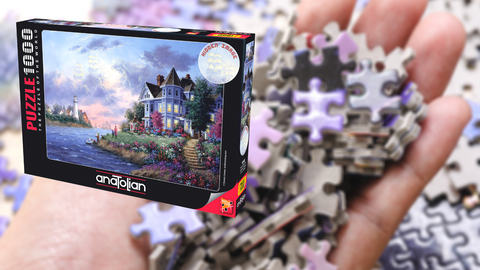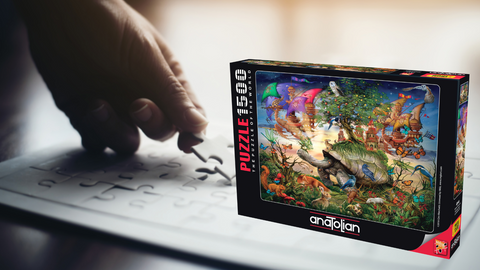Why Jigsaw Puzzles are Good for Your Brain
Not only are jigsaw puzzles excellent brain training and coordination improvement tools, they’re fun, too! Working a puzzle helps develop your abilities to reason, analyze, sequence, deduce, logical thought processes and problem solving skills. These types of puzzles also improve hand-eye co-ordination and develop a good working sense of spatial arrangements.
When you solve a jigsaw puzzle, you are engaging your brain to retain information on shapes and colors in order to choose pieces that will fit together properly. This hunt for pieces requires your brain to memorize what each piece looks like or what the shape should look like and what kinds of pieces you are searching for in order to complete the picture. Because you are likely doing this repeatedly as you search for puzzle pieces, the process reinforces short-term memory.
Jigsaw puzzles also promote the relationship between the left and right brain. The logical left brain looks at individual parts. It is sequential, rational, analytical and objective. The left brain is stimulated by problem solving. The creative right brain sees the big picture. It thrives on randomness, is intuitive and subjective, and even likes the unfamiliar. Jigsaw puzzles satiate the needs of both the left and right brain.
In solving jigsaw puzzles, the brain is being worked in both hemispheres, making connections between the sides as well as between brain cells. The connections enhance your ability to learn, understand and remember. Furthermore, each success with the puzzle – from individual piece placement to the actual completion of the puzzle – encourages the production of dopamine, an important neurotransmitter in the brain that regulates mood and affects concentration and motivation. Dopamine also plays a large part in memory and motor control.
If you really like a challenge, try the ‘blind’ technique in solving your puzzles. With this approach, study the image on the face of the jigsaw puzzle box only before you begin. Then put it away. You have to work from memory to rearrange the pieces and complete the visual. When you’ve mastered that technique, you can really give your brain a workout by trying to put a puzzle together face down – with no picture. It may not seem as exciting as watching the picture come together, but you’ll be working your brain extra hard to figure out where those pieces go.
Puzzles can also be relaxing. Concentrating on the puzzle pieces might help refocus the mind away from negative and stressful thoughts. Once you’re in a peaceful state of mind, cortisol and blood pressure levels drop to healthier levels. Since chronic elevations of cortisol in the bloodstream can lead to impaired cognitive abilities, anything you can do to reduce those levels can only be beneficial for your brain.



